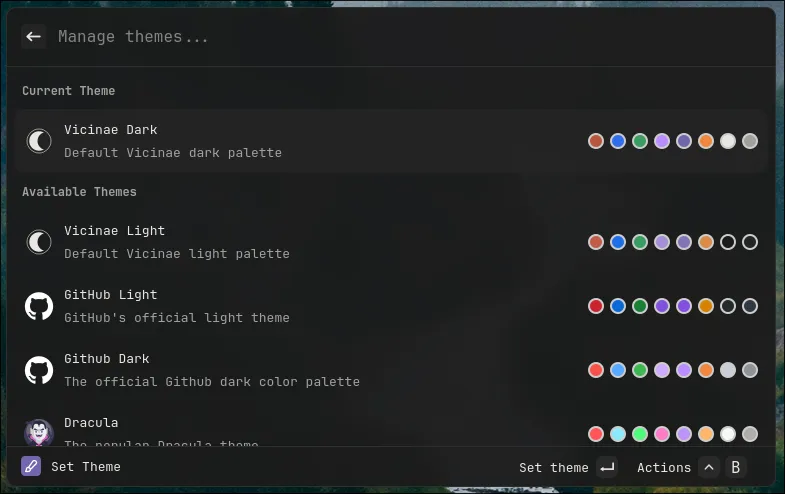Theming
Vicinae comes with its own theming system and does not integrate with your system theme for various reasons. Creating and switching themes, however, is simple and straightforward. This guide explains how to do both.
Default Themes
By default, Vicinae includes only two built-in themes: Vicinae Light and Vicinae Dark. Unlike third-party themes, these are not stored on the filesystem—they are embedded directly into every build.
The dark theme is selected as the default, regardless of your environment.
Changing the Current Theme
You can change the current theme in two main ways:
1. Using the "Set Theme" Command
The Set Theme command is available directly from the root search. Activate it, then choose the theme you want to apply. The selected theme will persist across reboots.

2. Changing the Theme from Settings
You can also open the settings window and select your preferred theme. This works exactly the same way as the Set Theme command.

3. Using deeplink
See here.
Creating a Custom Theme
Creating a custom theme is simple: just provide a JSON file with your theme information. Here’s an example:
{
"version": "1.0.0",
"appearance": "dark",
"icon": "./catppuccin.webp",
"name": "Catppuccin Mocha",
"description": "Soothing pastel colors for dark environments",
"palette": {
"background": "#1E1E2E",
"foreground": "#CDD6F4",
"blue": "#89B4FA",
"green": "#A6E3A1",
"magenta": "#F5C2E7",
"orange": "#FAB387",
"purple": "#CBA6F7",
"red": "#F38BA8",
"yellow": "#F9E2AF",
"cyan": "#94E2D5"
}
}
- The version field is not used at the moment but may become important in future updates. For now, use "1.0.0".
- The icon path is relative to the theme file. Only local paths are supported.
- Vicinae generates all necessary colors dynamically from the provided palette. Currently, semantic colors cannot be defined directly.
Place your theme files in $HOME/.config/vicinae/themes. Vicinae will recursively detect all .json files in that folder as new themes.
If your theme does not appear in the list after adding it, running the Set Theme command will refresh the available themes.
Vicinae Extra Themes
Vicinae should install a set of extra themes at the selected installation prefix.
You will usually find them at /usr/share/vicinae/themes/.
Note that user-defined themes (under ~/.local/share/vicinae or ~/.config/vicinae) will always have priority over system themes.